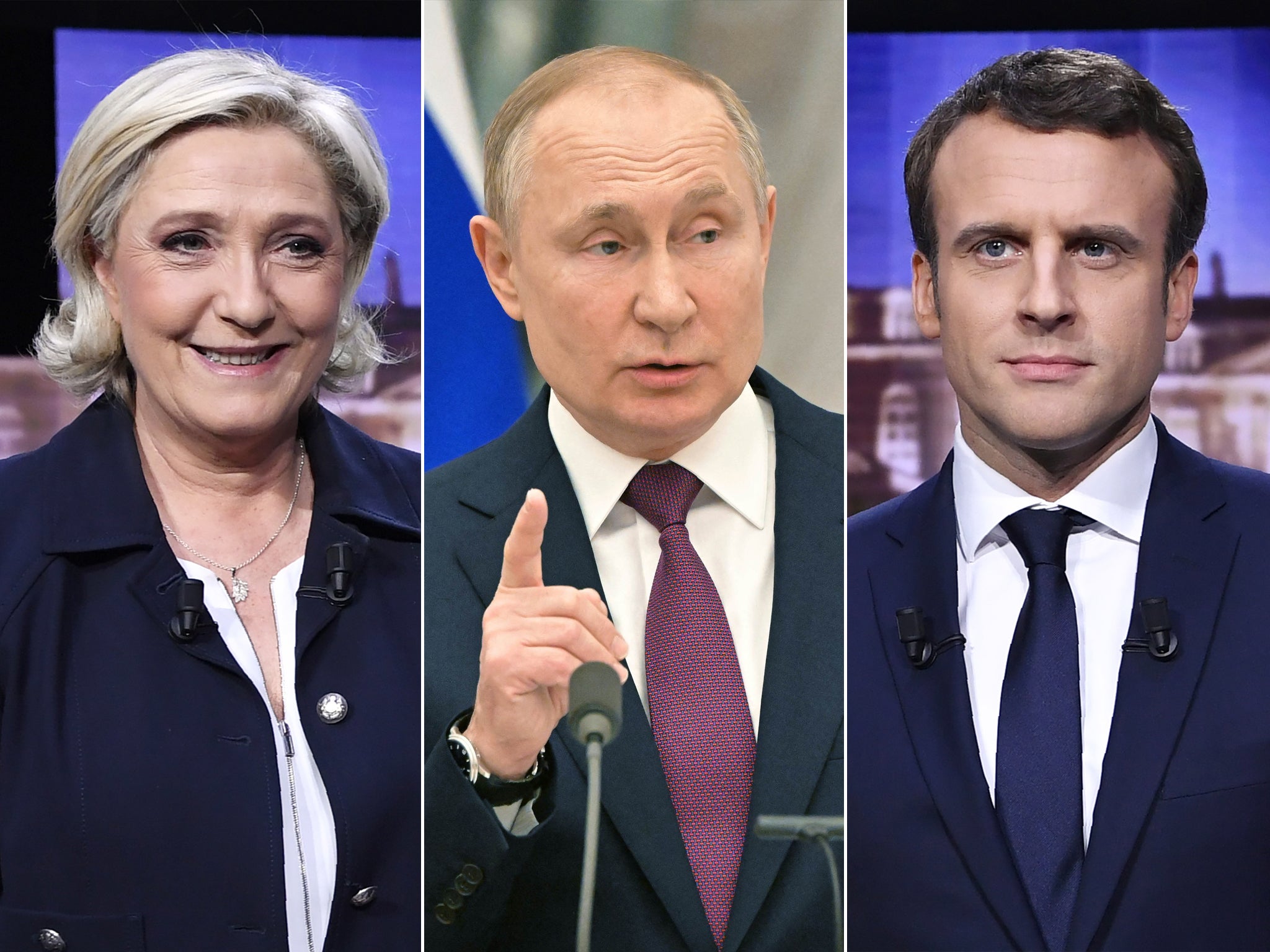Vladimir Putin congratulates Macron on French election win
Russian leader wishes French counterpart ‘success’ in second term
Your support helps us to tell the story
From reproductive rights to climate change to Big Tech, The Independent is on the ground when the story is developing. Whether it's investigating the financials of Elon Musk's pro-Trump PAC or producing our latest documentary, 'The A Word', which shines a light on the American women fighting for reproductive rights, we know how important it is to parse out the facts from the messaging.
At such a critical moment in US history, we need reporters on the ground. Your donation allows us to keep sending journalists to speak to both sides of the story.
The Independent is trusted by Americans across the entire political spectrum. And unlike many other quality news outlets, we choose not to lock Americans out of our reporting and analysis with paywalls. We believe quality journalism should be available to everyone, paid for by those who can afford it.
Your support makes all the difference.Russian president Vladimir Putin has sent his congratulations to Emmanuel Macron following the French leader’s election victory.
“I sincerely wish you success in your state activities, as well as good health and wellbeing,” Mr Putin said in a Telegram message to Mr Macron, according to a statement from the Kremlin.
Mr Macron beat far-right challenger Marine Le Pen on Sunday to secure a second term as French president.
He has been one of the few leaders to speak consistently to Mr Putin since Russia’s invasion of Ukraine in February.
The message from Moscow came hours after Volodymyr Zelensky, the president of Ukraine, took to Twitter to send his “true friend” Mr Macron well wishes.
“Congratulations to Emmanuel Macron. I wish him further success for the good of the people,” the wartime leader wrote, adding: “I appreciate his support and I am convinced that we are moving forward together towards new common victories. Towards a strong and united Europe!”
The war in Ukraine played a major part in France’s presidential election, with particular emphasis being placed on Ms Le Pen’s friendship with Mr Putin.
Often referred to as ‘Putin’s candidate’, Ms Le Pen was forced to tone down her previously pro-Russia rhetoric recently in a bid to stay relevant to French people. And despite trying to focus her campaign on domestic issues such as inflation and wage stagnation, the far-right politician came under intense scrutiny for her Kremlin ties.

Ms Le Pen faced criticism after a campaign leaflet featuring a photograph of her with the Russian leader was released. Her Rassemblement National (RN) party subsequently denied it had ordered local party offices to destroy the document after 1.2 million copies were printed and distributed last month.
A section of the eight-page campaign pamphlet highlights Ms Le Pen’s “international status”, featuring photographs of her with world leaders, including Mr Putin. The photo of the pair, taken when Ms Le Pen travelled to Moscow in the run up to the 2017 presidential election, did little to persuade voters she was not loyal to Mr Putin.
It followed previous reports that in October 2014, the far-right party, then called the Front National, borrowed €9m (£7.5m) from a Russian bank to finance its election campaigns.
During a highly publicised TV debate between Mr Macron and Ms Le Pen last week, the French president effectively accused his opponent of being on the Kremlin’s payroll, saying she was “dependent on Vladimir Putin” and incapable of “defending French interests” as a result.
“You depend on Russia and you depend on Mr Putin,” he claimed, referencing a loan that Ms Le Pen’s party got from a Czech-Russian bank “close to the Russian leadership”.
“When you speak to Russia, you are not speaking to any foreign leader, you are talking to your banker,” he added.
While Ms Le Pen made a point of distancing herself from the conflict – even going as far as expressing her “absolute solidarity and compassion” with Ukraine – it appears the damage was already done.
Mr Macron, on Sunday, went on to become the first French leader to win re-election for 20 years, scoring 58.54 per cent of the vote compared with Ms Le Pen’s 41.46 per cent.
In his victory speech, the pro-European centrist vowed to unite a divided France after and said he would respond “efficiently” to the “anger and disagreement” of voters who chose the far right.

Join our commenting forum
Join thought-provoking conversations, follow other Independent readers and see their replies
Comments